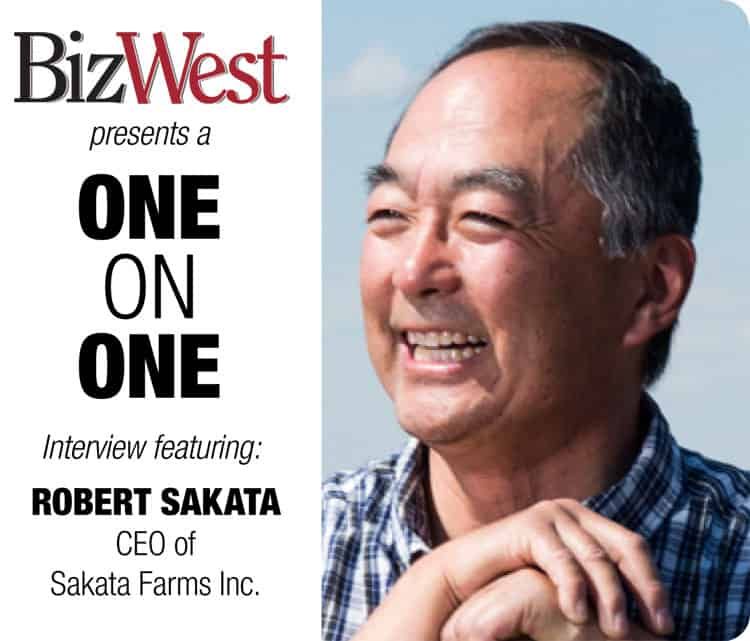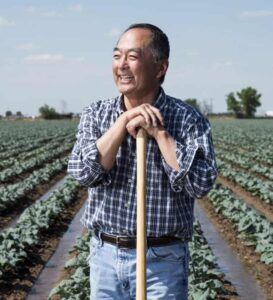Robert Sakata, CEO of Sakata Farms Inc.

Each month, BizWest asks a business leader to participate in a question and answer feature to help shed light on a business topic, an industry or add insight to a field of endeavor. With the growing season just now underway, Robert Sakata, CEO of Sakata Farms Inc., responds to questions.
BizWest: You’re entering your second growing season after pivoting away from sweet corn and other more labor intensive vegetable crops. How has the transition gone?

Robert Sakata: Part of me really misses doing the more labor intensive crops such as sweet corn, broccoli, cabbage, cauliflower. You hear the term action junky, and I think that is what I miss. There is so much pressure with perishable crops because you have such a narrow window to get things harvested and shipped that adrenalin keeps you going through some long hours. But most of me doesn’t miss the pressure. In the past I usually came down with a bad cold in November after things let up; I think my body was telling me I had to slow down. This past year was the first time that I can remember not being sick in November. For our sweet corn alone we were hiring about 200 people for the six weeks of harvest. All of the documentation from I-9’s, workers comp, wage and hour, employee and food safety trainings and managing all of the housing that we provided had become such a nightmare. Just on the food safety side alone we had over 50 clipboards around the farm with checklists that people had to fill out each and every day sometimes even hourly for parameters like ORP and chlorine concentrations. Just this past week I was updating our food safety plan, and it looks like just by removing all of the policies and procedures dealing with sweet corn we will reduce our plan by more than 250 pages!
SPONSORED CONTENT
Empowering communities
Rocky Mountain Health Plans (RMHP), part of the UnitedHealthcare family, has pledged its commitment to uplift these communities through substantial investments in organizations addressing the distinct needs of our communities.
BW: As someone who watches issues within the ag industry, how have changes to labor laws and immigration laws affected farmers?
Sakata: Change is inevitable, and so success is often based on how well you adapt to the changes. When I was in high school, a large percentage of our seasonal staff was made up of high school and even college students. Many have come back to thank my parents for providing them the opportunity to develop a strong work ethic and to earn money for a college education they knew they wanted because they didn’t want to be working on the farm the rest of their lives. As laws changed restricting work of young adults and as society changed and those young adults had different priorities, our operation changed and began to rely on seasonal migrant workers for whom we had to provide housing. As penalties for illegal workers and border security increased it became apparent that many of the seasonal and some of the fulltime agricultural workforce were not here legally. Historically what we have gotten paid for our products has not increased and we have only been able to cover increased input costs by becoming more efficient. I think this strategy is going to be especially important when it comes to labor as I don’t think we will ever see the agricultural workforce that we had in the past. We decided not to grow sweet corn anymore because we just couldn’t earn a living doing it and one of the major skyrocketing costs was labor but especially the seasonal housing that we had to provide. In the fruit and vegetable industry we are just starting to see the functional application of robotics. The challenge will be for the midsize operation to afford this new technology. So on the vegetable side I think we will continue to see consolidation of operations into larger firms that can provide employment and products year round, and we are going to see more protected environment operations that can operate 12 months a year.
BW: Your father and you carefully gathered water rights over many years sufficient to grow your crops. Have you been under pressure to sell those rights or make water available outside your land holdings?
Sakata: Fresh water is to urban development like painite is to a gemologist. At a recent water meeting the presenter showed pictures of huge ground subsidence due to the pumping of groundwater. Although the snowpack for this season looks tremendous and may even pose some flooding concerns the long-term question is where will water come from to sustain agriculture and to fuel future urban growth. We haven’t felt the pressure to sell our water rights, but I think that is partly due to the fact that as numerous smaller farmers have been retiring in our area, municipal interests have been picking them up. We have such a diverse water portfolio that I hope to keep it intact as that provides our overall farming operation some stability.
BW: What impact will the new Farm Bill have on your operation and on agriculture in general?
Sakata: First, I am not an expert on the Farm Bill because in vegetable farming we didn’t participate in many farm bill programs, even crop insurance. My support for the farm bill was strictly selfish because I figured that it kept other farmers from growing vegetables that I was trying to grow!
BW: What would you like to see with regard to tariffs and trading relationships with other countries?
Sakata: “Stability.” For any business the greater the certainty they will get a return on their investment the better, and especially for agriculture where the weather is so unpredictable. Isolation and fluctuating trade barriers only create chaos and drive business where there is less turmoil. When we know what the trade rules are going to be, we can learn to work with them. Many people may not know this but it is getting equally as difficult to market produce between states as it is with other countries because of the phytosanitary standards different states have.
__________________
Sakata Farms
384 E Bromley Ln, Brighton, CO 80601
(303) 659-1559
__________________
Each month, BizWest asks a business leader to participate in a question and answer feature to help shed light on a business topic, an industry or add insight to a field of endeavor. With the growing season just now underway, Robert Sakata, CEO of Sakata Farms Inc., responds to questions.
BizWest: You’re entering your second growing season after pivoting away from sweet corn and other more labor intensive vegetable crops. How has the transition gone?

Robert Sakata:
THIS ARTICLE IS FOR SUBSCRIBERS ONLY
Continue reading for less than $3 per week!
Get a month of award-winning local business news, trends and insights
Access award-winning content today!

